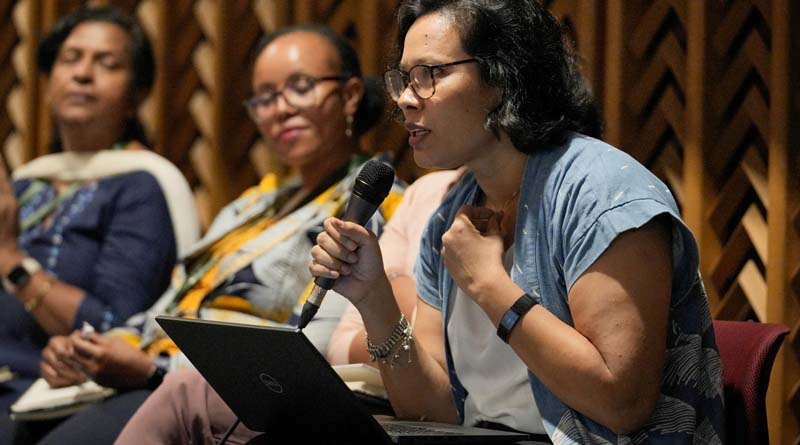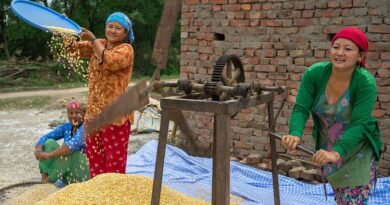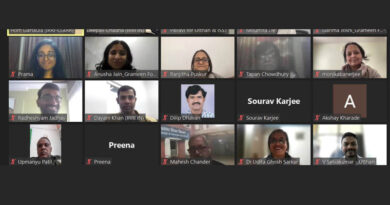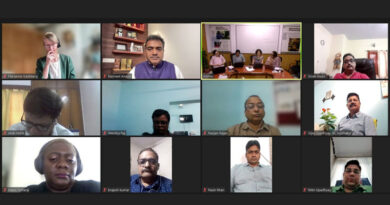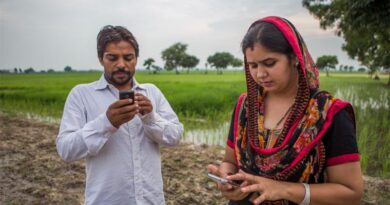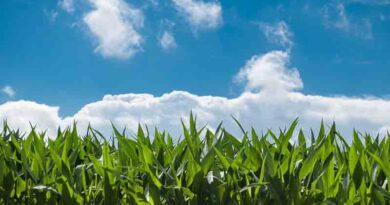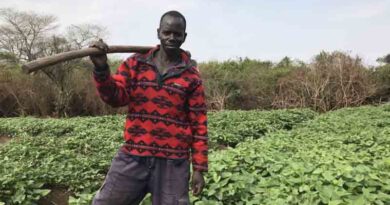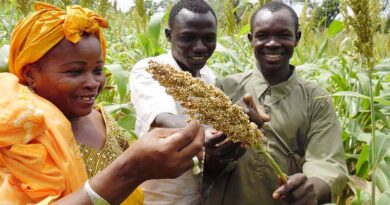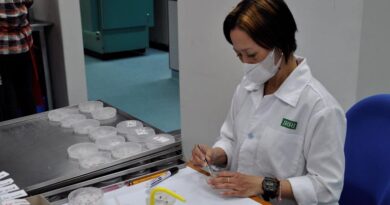Experts explore deeper underlying issues behind gender and youth roles for the development of rice-based food systems
18 October 2023, Africa: Gender in agriculture is more than the disaggregation of data based on sex. It goes beyond the realms of the mere number of men and women farmers. The deeper issues such as the impact of social dynamics and identities, technological changes, research, and opportunities in understanding equality and social inclusion were taken up at the 6th International Rice Conference.
Gender and social inclusion experts gathered at the panel discussion, Intersecting Identities of Gender, Youth and Class: What Matters Most for Research for the Development of Rice-based Food Systems, to explore the more complicated components behind the issue of gender equality and inclusion to achieve transformative change.
These include how social dynamics and identities shape the rice-based food systems; the effects of technological change on gender; the implications of research, policy, and gender-responsive practices; and the opportunities and gaps in the understanding of equality and social inclusion in these systems.
The speakers included Bimbika Sijapati Basnett, senior advisor for Gender Equality, Disability and Social Inclusion at theAustralia-Indonesia Partnership for Economic Development; Thelma Paris, an independent consultant and pioneer of gender-related research in rice-based projects at the International Rice Research Institute (IRRI); Alka Singh, head of Division of Agricultural Economic at the Indian Agricultural Research Institute; Gaudiose Mujawamariya, country representative and gender focal point at Africa Rice Centre; and Suchaita Tenneti, a scientist at IRRI.
Dr. Basnett shed light on the crucial role that women play in a food system. Her research classifies women farmers into three categories: land owners and managers, entrepreneurs, and agricultural labor providers. The classifications depend on factors like level of skill, access to information, and technology among others.
“When we speak about the role of women in agriculture very often the value of land takes precedence over the value of labor,” Dr. Basnett said. “Although women spend a considerable amount of time working in agriculture, they do not have a decision-making role across communities in South Asia. As farm laborers, the women mostly remain invisible.”
Dr. Paris discussed her experiences during her travel to India in the 1980s to see for herself the condition of the women associated with the Indian agriculture sector and the intersectionality of social class in the context of agri-food systems. She noted the lack of data, social scientists, established women groups, and accepted processes to integrate the gender perspective into the existing projects and technologies were some of the differences back then that are present today.
“Some of the most pertinent challenges in both rural and urban scientific communities were the deep-rooted social norms,” Dr. Paris said. “While in India we studied the context and collected information on agricultural labour, with a focus on women. Based on the gender-based research done in India the women empowerment index was developed.”
Dr. Tennati stressed the development of agencies where women are treated as experts because they have knowledge and insights into food systems.
“Often they shy away from speaking as good Indian women should not speak up but rather be quiet,” she said “It’s time we focus on moving beyond just sex disaggregated data to designing gender responsive projects and information pathways for gender development in the food system.”
Social inclusion should not only focus on human rights but on technology as well, according to Dr. Tennati. There is a need to conduct qualitative and quantitative research to define its impact.
“Technology is highly gendered,” she explained. “Merely talking about the uptake of technology by women farmers is not the right way to move forward but adopting a participatory approach to developing technology. “
Dr. Singh spoke about the impact of the outmigration of rural men on women, especially when they are the ones who are left behind to take care of the family and carry on farming activities.
Gender-responsive programs are at a very nascent stage at IARI and mainstreaming is important, according to her. Dr. Singh cited the new education policy at the institute encourages more women to join the agricultural sector through exposure visits and taking on roles as service providers or extension workers.
Africa has similar gender-related issues although the intersectionality of youth was a more pressing issue because of the high unemployment due to the increase in skilled labor, Dr. Mujawamariya reported.
“In the agricultural landscape of Africa there is also an intersectionality with religion, especially in Muslim-dominated communities where women farmers cannot discuss farming with male extension workers,” Dr. Mujawamariya said. “This presents an opportunity to train women as service providers and extension agents to train women farmers in Africa.”
The panel discussion was moderated by Dr. Ranjitha Puskur, leader of the Evidence Module of the CGIAR GENDER Impact Platform.
Also Read: International Tractors Limited (ITL) launched 5 new tractor series under the brand Solis
(For Latest Agriculture News & Updates, follow Krishak Jagat on Google News)

